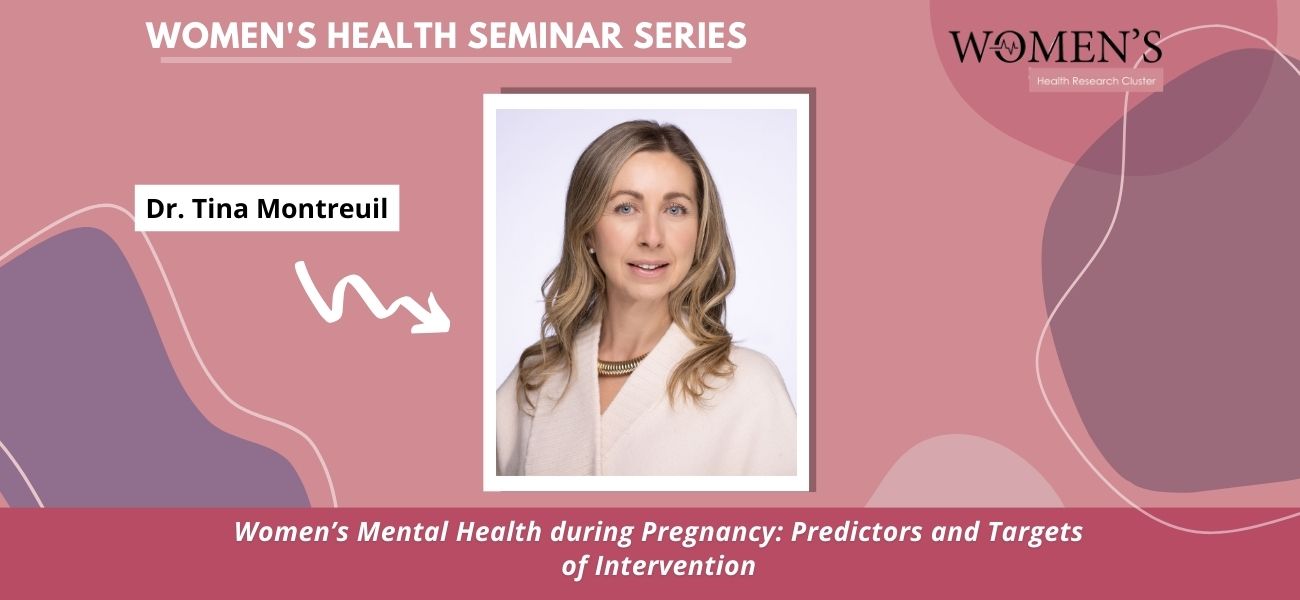Specificity of changes and importance of maternal well-being during pregnancy
March 11, 2024, 9:00 am to 10:30 am

Speaker: Dr. Tina Montreuil, Associate Professor, Department of Educational and Counselling Psychology, McGill University
Dr. Tina C. Montreuil is an associate professor in the Department of Educational and Counselling Psychology and an associate member of the Pediatrics and Psychiatry departments at McGill University. She holds a scientist appointment at the Research Institute of the McGill University Health Centre and is a research scientist at the Research Centre of the Sainte-Justine Hospital. Dr. Montreuil is also the director of Childhood Anxiety and Regulation of Emotions Laboratory C.A.R.E. Research Group and co-PI of the Montreal Antenatal Well-Being Study (MAWS), a prospective longitudinal birth cohort study. She is a recent awardee of the regarded Clinician Scientist Program – Empowering Next-Gen Researchers In Perinatal and Child Health (ENRICH) and a FRQ-S Research Scholar Jr. 1, equivalent to a provincial research chair. Montreuil’s research focuses on investigating predictors of intergenerational transmission of mental health and illness. Notably, her research has demonstrated that parent emotion regulation is mediated by parental emotion regulation socializing behaviours (supportive vs. punitive parenting practices) to predict child emotion regulation and future psychopathology. She holds several external tri-council agency funding (CIHR, SSHRC, NSERC, FRQS, FRQSC, FRQNT) as well as foundation grants (Health Canada, SACME, etc.). In terms of knowledge dissemination, Dr. Montreuil has published in several medical and education journals, co-authoring more than 150 scholarly articles, abstracts, presentations, and chapters.
Talk summary:
Pregnancy is accompanied by important physiological and affective changes due to strong hormonal surges. Among other things, pregnancy induces lasting changes in the mother's brain structure and function; in particular, women lose grey matter. These important changes in the brain, which begin during pregnancy and persist for at least two years after delivery, are said to prepare the mother for the demands of caring for her baby. However, since these changes occur in the regions involved in social interactions, such as the perception and interpretation of the desires, emotions, intentions and moods of others or oneself, according to scientific research, these unique alterations can also affect fetal development. Children born to women who report perinatal anxiety (stress) or mood difficulties are twice as likely to experience mental health problems across childhood and into adolescence. Thus, how can it be explained that so little attention is paid to the specific mental health needs of women during pregnancy? The presentation will explore the specificity of biological changes occurring during pregnancy that can critically impact maternal and fetal well-being and development and provide a rationale for why perinatal mental health should be viewed as a public health priority.
Mentorship opportunity:
Immediately following Dr. Montreuil's presentation, audience members will have the opportunity to hear more about Dr. Montreuil's career. This is an excellent opportunity for trainees to ask questions and learn more about careers in women's health.
Agenda:
9-9:45 : Speaker presentation
9:45-10:00: Question and answer period
10-10:30: Mentorship session